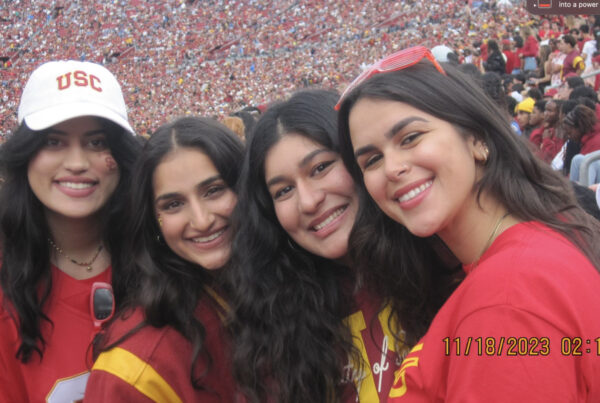This is a guest blog entry written by Julissa Campos. If you want to read more stories, visit viterbiadmission.usc.edu/latinxlives.
My name is Julissa Campos and I’m a senior studying Industrial & Systems Engineering. I am Latinx and also a first-generation college student. I live in Los Angeles County and I never once thought I would be attending USC, let alone be accepted into their engineering program. One day in high school, my dad called me to ask “Were you expecting a box from USC?” I wanted to share that moment with my family at home and jump around with joy, but fate determined I’d celebrate that moment at Costco.
For me, surviving college has been all about finding my friend group and my support system. It also helped that they were engineering majors because they understood how difficult it could be. I loved my high school as it provided me with so many opportunities like extracurriculars and AP classes, but once I started college classes, I realized how so many other people received a very high quality of education. My high school education seemed easy compared to others! Then I noticed a pattern: most people with that earlier exposure to topics that I was just learning at USC had attended private school. It’s easier said than done to ignore that socioeconomic divide. I felt like I was put at a disadvantage. And in some ways I was, but the obvious solution is to just work through that, right? At least that is what I was taught when I was younger. There’s actually no one right way to fight imposter syndrome. Personally, I went to the Kortschak Center for Learning and Creativity. I learned some great techniques that I still use, but I later realized managing imposter syndrome was much more than academic performance. For me, it was all about mental health and it can be hard to navigate these issues, but a good starting point is counseling at The USC Engemann Student Health Center. Just try therapy if it isn’t for you, but at the very least they can point you to resources USC has to offer. I am a HUGE proponent of mental and physical health and finding that work-school-life balance is so important.

I continue to experience imposter syndrome to this day, but not nearly as badly as my freshman year. During my freshman year I had these intruding thoughts of only being accepted because of tokenism. Now the advice people will give you to combat thoughts of tokenism is that you earned your spot. I knew that to be true because of my high school accomplishments, but being at USC, I saw so many people who are “better” than me. But I learned there’s so much more to a person than grades, truly. There’s passion and perspective. That is exactly why companies are looking for diversity, because you can bring so much to the table by being yourself than the conformity of the majority white demographic has to offer.
I inadvertently got involved with many programs at USC outside of classes and proved to myself that I have done much more than I give myself credit for. It kept me busy and once I realized everybody at USC is going at their own pace with different experiences, I kicked imposter syndrome to the curb. I also began to realize there were other people, especially women, within my classes going through the same problems and decided to help in any way I could. I began helping fellow struggling students with homework problems and joined more formal volunteer mentoring programs so I could help others.




